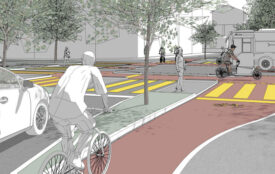Fraunhofer IAO presents a model for the engineering of services in the e-mobility sector
At the RESER conference in Copenhagen, Fraunhofer IAO premiered a service engineering reference model for the e-mobility applications sector before members of the service research community. In the future, this model will assist companies in systematically developing and bringing to market new services and business models.
Electric vehicles have yet to establish themselves in the German market. Funded projects primarily focus on technological development, and thus far little attention has been paid to services and business models in the e-mobility sector. Yet for the vehicles of the future it is precisely these accompanying service offerings that will prove essential to market success.
Model assists in the creation of new e-mobility services
For this reason, two Fraunhofer IAO researchers working in the DELFIN project are creating a practical innovation model that assists companies in a number of ways to create user-friendly services for the e-mobility market. One way it does this is by distinguishing customers and e-mobility users, and systematically integrating them into the development process. By doing so, companies can increase the acceptance of their e-mobility offerings. An intelligent configuration mechanism makes it possible to flexibly and easily adapt the process-activity model, the development-related organizational arrangements, and the chosen methods and tools to suit the development context. Furthermore, the process-activity model enables integrated design of the business model and service concept.
Going beyond the process-activity model itself, researchers Sabrina Cocca and Michaela Friedrich describe how it can be coupled to a company’s idea and strategy development. “What we’re especially interested in here is supporting companies that are new in the e-mobility market,” say the researchers. The innovation model also encompasses role models and support for agile management of service engineering projects. This enables short, synchronized, and parallel development cycles, in addition to close coordination among large numbers of stakeholders – which is extremely important in the highly networked e-mobility market. “A compact catalogue of established methods and tools gives companies the power to develop e-mobility services in the real world,” say the Fraunhofer IAO researchers. And finally, selected cases drawn from real business practice will permeate and illustrate the whole process.
Recommendations and guidelines planned for providers
The model is based on a wide-ranging analysis of 250 publicly funded e-mobility projects, the DELFIN expert study, an evaluation of 85 user analysis and user integration methods, international case studies as well as extensive literature research. Cocca and Friedrich will continue to enhance their model using feedback on the new service engineering reference model given by conference participants. Starting in early 2016 they will also be surveying users on factors such as user orientation, configurability, agile service engineering process design, chosen methods and tools, as well as the organization of service engineering workflows. Following a practical trial, recommendations for the development of new services and business models in the e-mobility sector will be formulated, and a set of guidelines for the practical application of the configurable and agile innovation model will be created.
Further information
- DELFIN-Expertenstudie:
www.elektromobilitaet-dienstleistungen.de - Engineering e-mobility services – moving beyond fast, cheap and convenient:
blog.iao.fraunhofer.de
Source
Fraunhofer-Institut für Arbeitswirtschaft und Organisation IAO 2015








